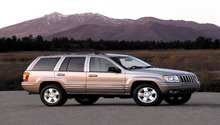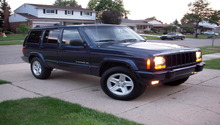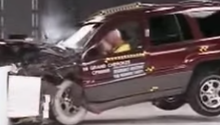Jeep Grand Cherokee 1999-2004: Recalls and Technical Service Bulletins
Recalls and technical service bulletins can be issued at any time. Read on to learn if any recalls or technical service bulletins have been issued for the Jeep Grand Cherokee.
This article applies to the Jeep Grand Cherokee (1994-2004).
A manufacturer can recall a vehicle at any time. However, the number one reason for a recall is that a safety issue arises. A recall can also occur if an updated (which usually means safer) part becomes available after a vehicle has already entered the market. If your Jeep Grand Cherokee is involved in a vehicle recall, you'll need to follow a few specific instructions to ensure your vehicle is promptly and properly repaired. If, on the other hand, a technical service bulletin is issued, then you'll need to work with your mechanic or a local Jeep dealer to have the malfunctioning part(s) replaced.
Jeep Grand Cherokee
Major Recall in 2014
The National Highway Traffic Safety Administration (NHTSA) asked Chrysler to recall select 1993-2004 Jeep Cherokees. The vehicles in question were those with a fuel tank located behind the rear axle. These vehicles were linked to a number of fatal crashes and said to be highly dangerous when rear-ended. Chrysler responded in 2013 by agreeing to launch a safety campaign as well as install aftermarket trailer hitches on the vehicles. Approximately 1.56 million 1993-2004 Jeep Grand Cherokees were involved in the recall. After much national debate, the NHTSA ultimately approved Chrysler's resolution on January 17, 2014. NHTSA continues to review findings from the recall investigation.

Brake Recall
Chrysler has issued multiple recalls for the Jeep Grand Cherokee, including a recall for the service brakes and vehicle speed control. The front disc brake rotors in select vehicles were subject to severe forms of corrosion, including damaging rust, that could impair the integrity of the rotor. A pedal misapplication was also a problem, as drivers could mistake the accelerator pedal for the brake pedal and become involved in a collision, as a result. Both recalls results in the installation of new, more effective braking system components.

Exterior Lighting Recalls
In 2006 and 2009, Chrysler recalled the 1994-2004 Jeep Cherokee for faulty lamp assemblies. The consequences of the faulty parts included decreased visibility and increased likelihood of a collision. Non-compliant lamps were replaced and refunds were issued. There were seven recalls in total for the faulty lamps.

Common Questions
Who pays for recall repairs?
You are not responsible for footing the bill for any repairs associated with a vehicle recall. The manufacturer will pay for recall repair costs.
What should I do if my Jeep is recalled?
In the case of a vehicle recall, you'll need to contact your local Jeep dealer.
- Provide the dealer with your vehicle identification number (VIN).
- The dealer will check that your vehicle is actually part of the recall campaign, which will ensure you're not held responsible for the bill.
- Make an appointment to have your vehicle serviced.
How are TSBs helpful?
Technical service bulletins provide important information about your vehicle and help you to save money in repair costs by narrowing down potential problems associated with your vehicle.
Common Issues
Power Train Problems
If you experience problems with your power train, check your vehicle's trouble codes. There might be a gear problem that requires professional expertise and specialized tools. Visit a local Jeep dealership for professional assistance immediately. Be sure to mention service bulletin number: 188200.
Brake Problems
If you notice bad brake odor, brake pull, or a recent drop in fuel economy, it's most likely time to have your existing brakes replaced. If your brakes are hot to the touch, this is another sign your brakes could be bad. If your brake pads are worn down, it's recommended that you have them replaced before operating your vehicle again.
Engine Rust
Keep your engine block free from damaging forms of corrosion by using a professional-grade engine cleaner and degreaser to remove dirt, rust and other forms of corrosion. Do this one to two times per year.
Technical Service Bulletins (TSBs)
Several TSBs have been issued for the Jeep Grand Cherokee. Here are just some of the most important ones you should know about:
- Power train: Faulty control module
- Air conditioner: Cooling coil odor
- Steering wheel: Creaking noise
- Electrical system: Malfunctioning indicator lamp
- Suspension: Faulty ball joint
- Fuel filler cap: Faulty
Related Sites
- NHTSA Statement on Chrysler Announcement - NHTSA.gov
- WJ Jeep TSB - wjjeeps.com






